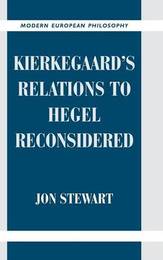
|
Kierkegaard's Relations to Hegel Reconsidered
Hardback
Main Details
| Title |
Kierkegaard's Relations to Hegel Reconsidered
|
| Authors and Contributors |
By (author) Jon Stewart
|
| Series | Modern European Philosophy |
|---|
| Physical Properties |
| Format:Hardback | | Pages:718 | | Dimensions(mm): Height 229,Width 152 |
|
| Category/Genre | Western philosophy - c 1600 to c 1900
Religion and beliefs |
|---|
| ISBN/Barcode |
9780521828383
|
| Classifications | Dewey:193 198.9 198/.9 |
|---|
| Audience | | Professional & Vocational | |
|---|
|
Publishing Details |
| Publisher |
Cambridge University Press
|
| Imprint |
Cambridge University Press
|
| Publication Date |
15 September 2003 |
| Publication Country |
United Kingdom
|
Description
Jon Stewart's groundbreaking study is a major re-evaluation of the complex relations between the philosophies of Kierkegaard and Hegel. The standard view on the subject is that Kierkegaard defined himself as explicitly anti-Hegelian, indeed that he viewed Hegel's philosophy with disdain. Jon Stewart shows convincingly that Kierkegaard's criticism was not of Hegel but of a number of contemporary Danish Hegelians. Kierkegaard's own view of Hegel was in fact much more positive to the point where he was directly influenced by some of Hegel's work. Any scholar working in the tradition of Continental philosophy will find this an insightful and provocative book with implications for the subsequent history of philosophy in the twentieth century. The book will also appeal to scholars in religious studies and the history of ideas.
Reviews'Jon Stewart's Kierkegaard's Relations to Hegel Reconsidered is an outstanding and original scholarly achievement which will forever change the simplistic and widely shared stereotype of Kierkegaard as a lifelong, implacable, knee-jerk opponent of Hegel ... In his eye-opening study Stewart takes us beyond the sterility of a relation of absolute, mutual negation between Kierkegaard and Hegel and has demonstrated beyond dispute the many ways in which Kierkegaard was influenced not only negatively, but even more important, positively, by Hegel. Kierkegaard borrowed and adapted arguments and methodology from the great German philosopher, not only during his early years but throughout his entire career.' Bruce Kirmmse, Connecticut College '... a major achievement in contemporary Kierkegaard scholarship ... As Stewart points out, the relationship between Kierkegaard and Hegel has been a common topic of comment in general histories of nineteenth-century thought, and the book will therefore be of interest beyond the world of those taking or conducting courses in Kierkegaard's thought.' George Pattison, King's College Cambridge 'Stewart has blessed the English reading public with his monumental effort ... I am enriched by the philosophical, literary, and historical information in his book ...' International Journal for Philosophy of Religion
|